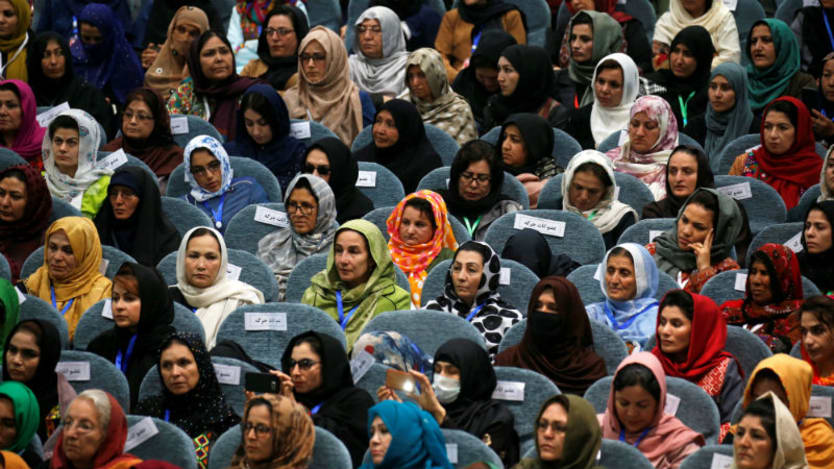
In Afghanistan, international engagement in peacebuilding efforts has not been successful so far — if not an outright failure. The result has been a series of loose talks with the exclusion of Afghans, contrary to what is claimed to be an “Afghan-led and Afghan-owned” peace process. There are many possible explanations for this exclusion: from narrow policies and strategies to short-term-oriented results; seeing the peace efforts as a project but not a process; not considering the broader region and its power relations; and not considering local peacebuilding potential and local voices.
In the Afghanistan peace process, top-down peacebuilding efforts have been so emphasized that the gap in local voices and people on the ground, and their potential contribution — women included — is deeply felt.
More on Afghanistan:
► Opinion: A long-term vision is critical for women's empowerment in Afghanistan
► Delivering health in conflict: A different approach in Afghanistan
It is time for the players and actors in the Afghanistan peace process to start thinking about a bottom-up approach, civil society engagement, and participation of local communities and women. Local engagement, which brings a sense of ownership, is an essential element toward a holistic peace in post-conflict societies.
We should take into account that building the infrastructure for peace must be based on the culture and community itself. Conflict-affected communities have the best conflict-solving and peacemaking potential within themselves. The resource needed for peace is actually “rooted in the local people and their culture,” according to scholar John Paul Lederach. And the best solution for achieving sustainable and effective peacemaking is creativity in finding, empowering, and utilizing these local and sociocultural means.
But this requires the international community to see people as “resources,” not “recipients.” Despite the crucial importance of what is known as the “local turn,” international peacebuilding agendas have been increasingly criticized for ignoring local voices and engagements in these efforts.
Afghanistan is a traditional country; we have many culturally specific methods of conflict-solving in place, which are deeply rooted in local culture and community. They include tiga (placing a stone as an act of emphasizing the end of the conflict), nanawati (seeking shelter, even from your enemy), and Loya Jirga (a consultative assembly), which range from stopping conflict to seeking shelter, negotiating, meeting, and dialogue. Yet unfortunately, most of these traditional conflict-solving means have been forgotten. When we occasionally have a Loya Jirga, it is far from the participatory and inclusive council that it should be.
When considering the local turn, we should mention the role women could play in bridging top-down and bottom-up approaches. Through all these decades of conflict and turmoil in Afghanistan, many Afghan women activists and peacebuilders have tried to be the agents of knowledge, awareness, change, peace, tolerance, and coexistence. As part of the local community, Afghan women have been immensely successful in bringing change into the lives of people in the most forgotten parts of the country, through their everyday engagement and activities in the most conflicted, remote, and insecure areas.
It was women who ran hidden schools for boys and girls through the gloomy era of the Taliban regime, when no schooling was allowed for girls. And it has been Afghan women who are in close contact and engagement with local people to learn about their plights and fears, as well as their strengths and hopes. It is also Afghan women activists who have access to local people, minority groups, and even the families of members of insurgent groups and the Taliban.
Afghan women not only develop strategies to alleviate inequalities and discrimination against themselves, such as providing education for girls and building networks of women working on women’s issues. They are also very expert in addressing the issues of people on the ground, such as providing awareness-raising and entrepreneurship, and countering violent extremism with training aimed at deradicalization. Women’s engagement through such activities and agencies has all been based on local cultures and traditions.
Through my interaction with grassroots peacebuilding organizations led by Afghan women, I’ve learned of many cases of deradicalization also led by them. One woman demobilized 11 Taliban groups using a variety of tactics, from approaching their female family members and asking them to act as intermediaries, to providing them with financial help to launch small businesses. The Afghan women practitioners, activists, and NGO workers I met are very strategic in identifying the points of entry into local communities in the most remote and conservative areas, in order to deradicalize them.
This level of localism, and attention to local needs and demands, is gained through a participatory approach and engagement with the everyday life of the people and those directly affected by conflicts — whether as ordinary civilians, soldiers, or even insurgents. Involving women peacebuilders in dialogue and confidence-building efforts could be the first step toward an inclusive peace process.
Including grassroots organizations with a focus on women and their experience, both in top-down and bottom-up approaches to peacebuilding, is imperative in the Afghanistan peace process if we want to secure sustainable and inclusive peace for the future.








